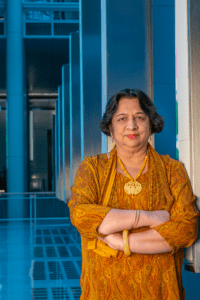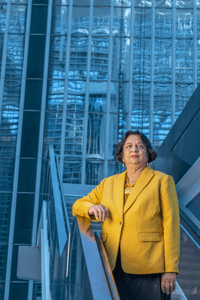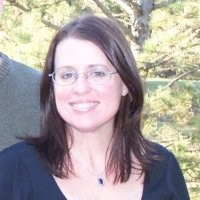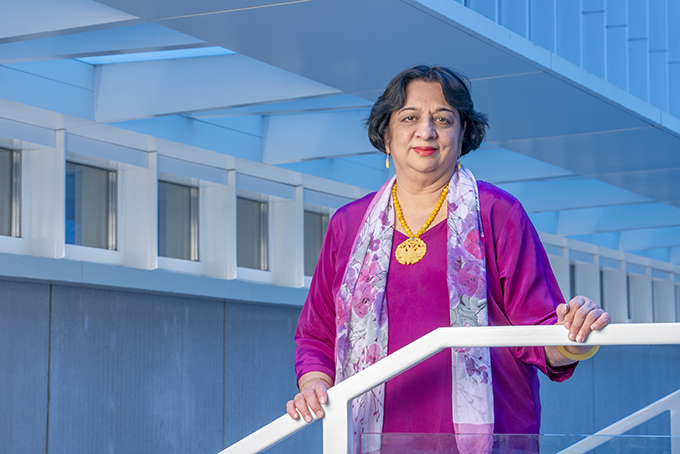As a child, Sheila Jagannathan spent long hours with her grandfather, a Sanskrit scholar who taught her about the ancient texts and the importance of continuing to improve your intellect. “He inspired me to follow a path of lifelong learning,” Jagannathan said.
Later while at Boston University, she was further inspired by the work being done on computer-based learning and artificial intelligence for education. That led her to change her coursework to education technology with a focus on intelligence systems that provide an adaptive learning environment. It was still the 1990s, when such technologies were nascent in the field of education. But over her career they have blossomed, and Jagannathan, now lead learning specialist and program manager of World Bank’s Open Learning Campus, or OLC, has been active in this evolution.
“There has been more disruption in education in the last eight years than the previous 100,” she said. “As the fourth industrial revolution rapidly unfolds, the agility to continuously learn, unlearn and relearn will be the capstone to a successful career. It’s a great time to be in this field.”
A Global Approach
In 2001, after spending time in the private sector and with government agencies, Jagannathan joined the World Bank Institute in Washington, D.C., as an e-learning specialist. At the time, 95 percent of the institute’s training was delivered in face-to-face settings. The content was excellent, but not scalable. The World Bank has clients and staff across the globe, many in developing countries with few resources to travel for training. Jagannathan and her team knew there was a better way.
“We wanted to create a single destination for distance learning that would provide an ecosystem for staff and clients to access education and share knowledge,” she said.
Taking inspiration from education technology leaders, including Salman Khan, creator of the Khan Academy, and Michael Crow, president of Arizona State University, she envisioned a future in which World Bank knowledge and content could be converted to distance learning formats that could give clients and staff around the world access to content, while supporting opportunities for interaction and engagement. Jagannathan achieved this vision with the launch of the World Bank’s OLC, which is now part of the Global Operations Knowledge Management practice of the World Bank. “It’s like an e-University for global practitioners.”
The OLC, which launched in 2016, is a technology-driven platform for development learning to build the leadership and technical capabilities of all development stakeholders, including partners, practitioners, policy makers, staff, academics and the public. The courses help scale development learning by providing a comprehensive learning curricula with wider access and enhanced learner experiences.
“The goal of OLC is to provide dynamic learning opportunities where diverse audiences can learn at their own pace and access the knowledge they need to tackle the toughest development challenges, including climate change, universal education for all, health systems for the poor, gender issues, etc.,” Jagannathan said.

Tens of Thousands Attend First MOOC
The OLC team began by creating a MOOC on how to secure financing to achieve the United Nations’ 17 sustainable development goals, or SDGs, which include eliminating hunger, achieving gender equality, and providing quality education and clean water.
“Since achieving the SDGs will require far more funding than aid can provide, the World Bank Group, together with other multilateral development banks and the [International Monetary Fund], committed to use billions in investment funding, aid and grants to catalyze trillions in financing of all kinds,” said Julius Gwyer, program officer in the development finance vice presidency of the World Bank Group in Washington. “World Bank clients need guidance on how to find and mobilize sources of financing. The MOOC was a tremendous opportunity to raise awareness of the agenda.”
Gwyer’s team reached out to Jagannathan for help creating a program to assist clients to better understand how public and private sources of financing could be accessed worldwide. She first helped them define the goals of the program, the audience and the timeline, then she recommended a MOOC as the best solution to meet their goals.
Once the idea was approved, they created the content and format for a four-week MOOC taught by five World Bank instructors along with presentations from government officials and private sector experts. The free course was open to anyone anywhere in the world with internet access.
The OLC team wasn’t certain who in the community would respond, but they were pleasantly surprised. Approximately 50,000 participants from nearly 200 countries and territories signed up for the two offerings of the course. “We were delighted by the strong support and levels of participation we received for the MOOC, which included a number of policy-makers, government ministers and private sector investors, and colleagues in other international organizations,” Gwyer said. Based on its success, plans are underway to offer the course a third time, drilling down into case studies and more specifics on innovative financing approaches and instruments.
“Our participants aren’t just coming to hear from experts,” Jagannathan said. “They want an opportunity to connect with peers to share knowledge, exchange ideas and co-create solutions.”
One of the great features of this and other OLC MOOCs is that even though it is distance learning, there are opportunities to engage and interact with the content and other participants, Jagannathan said. “It is an open, interactive and networked environment, where development lessons continuously captured throughout the world are available at your fingertips just in time and in versatile formats — from bite-sized lessons to full-length courses to peer-to-peer conversations.”
Along with message boards, which averaged hundreds of posts per week, participants were asked to identify a development problem in their communities as a final project and propose a financing solution by applying lessons from the course. They produced almost 1,800 creative digital artifacts, many of which could be used to launch real-world financing projects. “We have generated a lot of awareness in a lot of communities with this course, and a call to action was put out encouraging participants to be innovative within their professional contexts,” Gwyer said.
Something for Everyone
Since that first program, OLC has rolled out a number of additional MOOCs expanding on the financing course and tackling other big topics, which they host throughout the year. The OLC team has also built a library of bite-sized training for staff on the go, self-paced courses and other knowledge content, including lectures, papers and documents.
“Sheila has developed a suite of learning products and tools that are increasing the World Bank Group’s outreach and capacity building, enabling deeper engagement with development partners around the world,” Gwyer said. “I congratulate her and her team on this incredible accomplishment.”

She’s also become a valuable resource to department heads across the World Bank Group, including Samuel Lantei Mills, senior health specialist for the World Bank in Washington. In 2015, Mills reached out to Jagannathan for help developing a course on how to enhance local capacity for improving civil registration and vital statistics (CRVS) systems in low and middle-income countries. The goal was to encourage communities to create official documents for births, deaths and other life events so citizens have a documented history and communities have a better sense of their population trends.
Many of the sustainable development goal indicators require functioning CRVS systems for effective monitoring. However, more than 100 low- and middle-income countries have deficient systems, according to a World Bank report co-authored by Mills. “Civil registration is key to identifying the poor to provide them with essential social and financial services,” Mills said. “Vital statistics are crucial for planning and monitoring each country’s targeted policies, programs and services.”
Mills knew a distance learning-based training program could be a cost-effective and far-reaching way to promote adoption of CRVS systems. “But I had no experience creating training,” he said. So he asked Jagannathan for help.
She guided his team through every step along the way, from setting learning goals and developing content to helping them secure resources to fund the project. OLC launched a self-paced version of the course in May 2017 — ahead of schedule — and rolled out a fully facilitated distance learning course with 13 modules guided by global experts later that year. “This course is having a real impact on people in many countries,” Mills said.
Additionally, Jagannathan assisted with the launch of a French version of the course in June 2018, and a Spanish version will be released shortly.
“We are very grateful to Sheila and all of the people she helped,” Mills said. “This was our first foray into developing a state-of-the-art e-learning course, and she was a partner to us throughout the process.”
https://youtu.be/SwnkrEZyoEk
The Future Is Virtual
Jagannathan continues to work with her OLC staff and World Bank partners across the globe to generate new MOOCs, self-paced courses and other e-learning elements to foster a culture of global knowledge sharing and to ensure the data and ideas generated by the World Bank have a platform from which to be disseminated. This includes transforming the World Bank’s annual “World Development” reports into e-learning modules to make them more accessible to a broader audience.
She noted that these reports provide vital data on global trends and risks, but they can run up to 1,000 pages, making them difficult to digest. Instead, her team is converting them into four-week MOOCs that are highly interactive, including lectures and opportunities to discuss results. Thousands of people have attended the MOOCs.
It’s just another example of how her team is rethinking the way World Bank provides content to its constituents. “We have flipped the model to 95 percent distance learning and 5 percent face-to-face,” she said. “On the rare occasion when we do face-to-face programs, we can focus on networking and dialogues about problems and potential solutions instead of lectures.”
She’s also delving into the world of virtual reality, testing the potential for immersive learning programs to help stakeholders better understand the experiences and challenges faced by teams in these communities. In one of the first pilot courses, called Journey to Fiji, participants experience lives of four Fijians to see how climate change is affecting their lives now and what it could mean for their future. In another, participants experience life at a rural school that has one drinking fountain for 600 students and teachers.
By immersing participants in the experiences of these citizens, VR learning has the potential to engage them in stories they can’t experience firsthand, sharing development projects in fragile environments and crisis scenarios, Jagannathan said. “It is a way to show various stakeholders, including donors, policymakers and other partners, the impact they are having in a way we couldn’t before due to remoteness, security and other issues.”
She believes that VR, along with AI, geospatial data and learning analytics, will continue to spur the evolution of educational technology, giving participants a more personalized and experiential learning ecosystem — and she’s excited to be a part of it. “This is the golden age for learning, and we have so many more opportunities to scale up globally with impact.”















